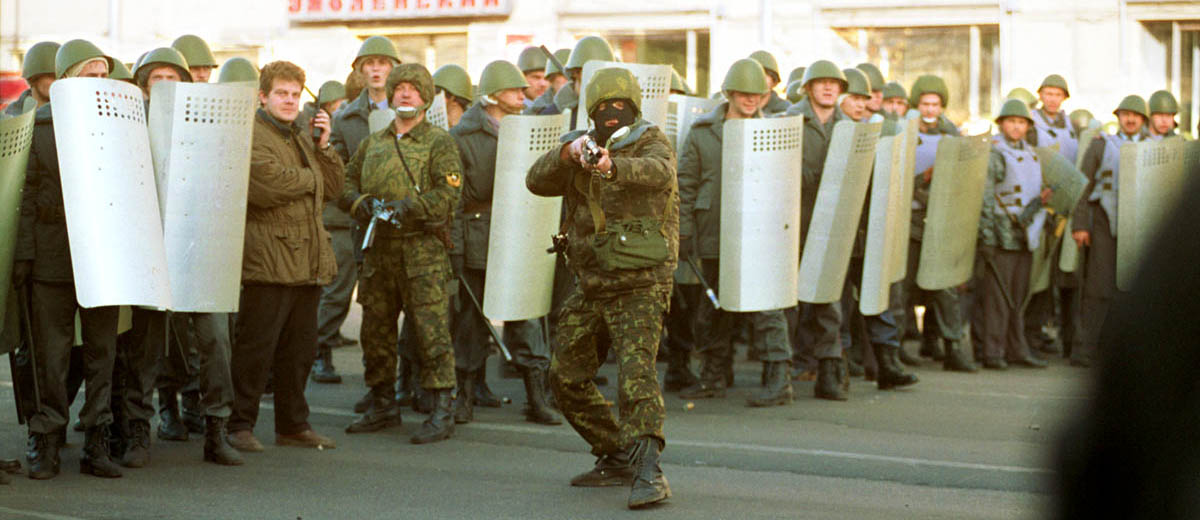
Sucking Chest Wound
Thirty years ago last week, I was lying face down, skull scratched by a bullet, ribs shattered, slipping in my own blood. When I tried to inhale the air gurgled in through my sucking chest wound. I was in Moscow working for the New York Times covering a coup attempt against Boris Yeltsin. It was October 3, 1993, and I had followed protesters as they amassed at the city’s main television tower. Suddenly a guy standing next to me fired a rocket-propelled grenade into the building defended by Yeltsin troops, and in the ensuing battle dozens around me were killed. I found temporary sanctuary behind a concrete flowerpot until a bullet grazed my skull. The next one went through my ribs, diaphragm, lung, liver, and out my back. A guy next to me was trying to rescue me but everything suddenly seemed very distant, like I was looking through binoculars the wrong way.
 Not all backstory is this dramatic, or bloody. But over the decades this episode for me has morphed from debilitating horror to something I’m willing to leverage as a story, and while talking about this episode still conflicts me, there are valuable lessons for every founder—really, for anyone who is working to turn their career progression into a tidy narrative that motivates and justifies what comes next.
Not all backstory is this dramatic, or bloody. But over the decades this episode for me has morphed from debilitating horror to something I’m willing to leverage as a story, and while talking about this episode still conflicts me, there are valuable lessons for every founder—really, for anyone who is working to turn their career progression into a tidy narrative that motivates and justifies what comes next.
The classic movie plot is as follows:
- Hero is living life
- A challenge disrupts the equilibrium
- Hero struggles to overcome and almost fails
- Hero perseveres and has a realization
The classic career change plot is similar:
- I was doing some job that wasn’t my true calling
- Something happened that forced a choice
- The results of the choice were painful but necessary
- Now I’m doing this amazing new thing
Here’s how I frame my near-death experience as a life-defining moment in my current bio, which is sufficiently true:
- I wanted adventure and found it
- Adventure & curiosity nearly killed me
- In my recovery I knew I had to find something more sustainable
- In combining entrepreneurship and communications, I found something that satisfies my curiosity, but with fewer bullets
Just like in a movie, the more powerful the disruption and the bigger the challenges, the deeper the resolution/realization resonates.
So, OK, my story gets points for drama. But I have seen much gentler career-change plot devices generate as much oomph, or more. Being broke was enough to justify the career pivot made by Brian Chesky and Joe Gebbia to found Airbnb. The hoary “I was making lots of money in career X but feeling increasingly empty” is a classic crisis that inspires change (often, apparently, to become a career counselor).
Every founder requires a motivation. That motivation can be the fact that the founder discovered or invented something, but in most cases it’s something that justifies why the founder picked this one business out of the universe of options. What pushed you? What moment made your path pre-ordained?
Legendary VC David Hornik explained how crucial this motivation is to capture his interest:
Why is this your story? Here’s what’s not a good reason: I wanted to be a hero, so I went looking for a dragon to slay. And in this far off land I found one. I don’t care as an investor, and I can tell you don’t care either. And if they say what, you don’t care about the damsel in this town? The dragon is guarding a pretty big pile of coal! Here’s my answer: I know the dragon still breathes fire, and I’m pretty sure you’re going to give up the first time you get singed.”
So find something that motivated you—drove you—to pursue the path you’re on now.
The motivation doesn’t have to be dramatic, and it can be selected to fit the outcome. My good friend Desmond Butler is an investigative reporter for the Washington Post. He recently visited me and told me about his investigations into the shady world of bodybuilding. Desmond’s father filmed the movie Pumping Iron, which was an important step in launching Arnold Schwarzenegger’s movie career. So when Desmond wrote a series of articles about the questionable ethical practices in bodybuilding, there was a natural story about how a reporter was honoring the memory of his father by exploring today’s realities behind his father’s most famous work. This personal angle makes such a great story that the Post wrote a whole article about it. Desmond goes from just being the faceless reporter with a byline to being a hero of the tale. With this backstory, Desmond seemed destined to write these articles.
It’s the same for your founder’s myth, or anytime you’re justifying a new job or career transition. The human mind looks for cause and effect, for a why behind every what. So look through the material you have to work with, and then select and showcase. Pull out your best and then send me your updated bio!
 Back in Moscow, a man saw that I was still moving and dragged me away from the shooting. I called out that my intended savior (total hero) was still lying there. Another guy went running in and was hit through the back and killed. It was an awful night, and my survival and comparative good fortune have weighed on me. I’ve processed the events in various ways, including finding the guy who shot me. Decades have given me distance. In a larger sense it’s a bit like the moment after the initial terror of being knocked down by the RPG had passed. I was trapped in the middle of the gunfight, but decided I should take pictures. It was not where I wanted to be, but I figured what the hell: This is where I landed, so I might as well make the best of it.
Back in Moscow, a man saw that I was still moving and dragged me away from the shooting. I called out that my intended savior (total hero) was still lying there. Another guy went running in and was hit through the back and killed. It was an awful night, and my survival and comparative good fortune have weighed on me. I’ve processed the events in various ways, including finding the guy who shot me. Decades have given me distance. In a larger sense it’s a bit like the moment after the initial terror of being knocked down by the RPG had passed. I was trapped in the middle of the gunfight, but decided I should take pictures. It was not where I wanted to be, but I figured what the hell: This is where I landed, so I might as well make the best of it.
Otto Pohl is a communications consultant who helps startups tell their story better. He works with deep tech, health tech, and climate tech leaders looking to create profound impact with customers, partners, and investors. He has taught entrepreneurial storytelling at USC Annenberg and at accelerators across the country. Learn more at www.corecommunicationsconsulting.com
